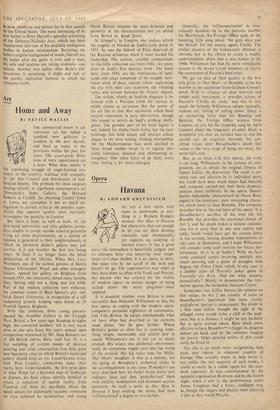Opera
Havana
By EDWARD GREENFIELD
AT last a new opera with tunes as memorable as any- thing in a Richard Rodgers musical. Our Man in Havana has characters clear-cut enough to let you see them develop musically and dramatically,- yet requires no studying of learned essays. It has a good Story; the atmosphere is beautifully judged; and its choruses have you annoying. your. neigh- bours to Cuban rhythm. It is an opera, in short, that takes you by the scruff of the neck and doesn't let go. The supersensitive may rebel as they have done so often with Verdi and Puccini, but anyone who has concern for the vitality of modern opera--in serious danger of being sucked down the serial plug-hole--must applaud.
It is doubtful whether even Britten is more successful than Malcolm Williamson in this, his first opera, at coping with the modern opera- composer's perennial nightmare of communica- tion. Like Britten, he adopts unashamedly what we have often had described as 'an outworn tonal idiom,' but he goes further. Where Britten's genius so often lies in creating some- thing simple, memorable and utterly'' new in sound, Williamson's ear is not yet so nicely attuned. His essays' into deliberate 'obviousness really do sometimes topple over into the world, of the musical. His big waltz tune for Millie, 'Our Man's' daughter, is line as a melody, but the aping of Broadway's orchestral tricks in the accompaniment is too close. Prokofiev's son once described how his father wrote down very ordinary ideas and then 'prokofievised' them with unlikely modulations and dissonant accom- paniment. At such a point in Our Man in Havana I kept wishing the music had been 'williamsonised' a degree or two further. Generally, the 4williamsonisation' is mar- vellously handled—as in the patriotic number for Hawthorne, the Foreign Office man, or the haunting little song about 'the grey days and the drizzle' for the enemy agent, Carter. The similar mastery of the Cuban-style choruses is obvious, but in his efforts to create a readily understandable idiom that is also honest to the 1960s Williamson has had his most remarkable success in the broad lyrical numbers, so clearly the counterpart of Puccini's brief arias.
We get an idea of their quality in the first aria given to 'Our Man'—or Bramble, as he has become in the adaptation from Graham Greene's novel. With its reliance on clear intervals and simple scale movement, it provides echoes of Puccini's `Ch'ella mi creda,' and this is very much the formula Williamson adopts naturally, without any feeling of talking down. There is an ,enchanting letter duet for Bramble and Beatrice, the Foreign Office woman from London; an aria for her (superbly sung by April Cantelo) about the imaginary air-pilot, Raul; a wonderful trio over an ostinato bass to end the second act; an exquisite threnody for con- certed voices after Hasselbacher's death that comes to the very verge of being too sweet, but never falls over.
But, as so often with first operas, the work is too long. Williamson, in the process of com- position, cut to shreds the original libretto of Sidney Gilliat, the film-writer. The result is cer- tainly taut and effective in its individual parts, but could have been much tauter had librettist and composer carried out their basic dramatic analysis more ruthlessly. In the opera, Hassel- bacher (splendidly characterised by Owen Bran- nigan) is the dominant, most interesting charac- ter, much more so than Bramble. The composer describes him as 'the real hero of the opera.' It is Hasselbacher's sacrifice of his own life for Bramble that provides the emotional climax of Act 3, and his death makes a natural culmina- tion for a story that in any case cannot end tidily. Verdi would have got the curtain .down in ten seconds, leaving detailed explanations to take care of themselves, and I hope Williamson will consider some such revision for future per- formances. As it is, at Sadler's Wells we have some confused scenes involving multiple sets, much shooting and a game of draughts with Segura. the Police Chief, which, in any case, is a feebler echo of Puccini's poker game in Fanciulla del West. And for what purpose dramatically? Merely to demonstrate the retri- bution against the incidental character Carter.
Sometimes, too, Gilliat betrays his reliance on film values. In Act 2 the transfer of scene to Hasselbacher's apartment (the same clumsy multiple-set device) is unnecessary. No doubt as a film man Gilliat thought the sight of the pillaged room would strike a chill in the audi- ence, but at a distance it might be any bachelor flat in quite normal chaos. How much more ' effective to have Hasselbsic"r stagger in, dragoon helmet on head, and let the audience imagine the horror. Other detailed points of plot could easily be fitted in.
Yet this is so much more invigorating than most new operas in . whatever country of Europe. One actually .wants to help revise it, for, ,unlike the vast majority of such works, it could so easily be a 'viable opera for the stan- dard repertory. It was •commissioned by the
splendid organisation Rostrum, and by the fourth night, ss hen I saw it, the performance under
James Loughran had a fruity, confident ring, as though the singers and players were enjoying it just as they would Puccini.


































 Previous page
Previous page